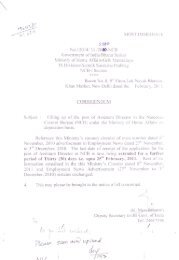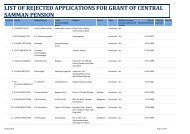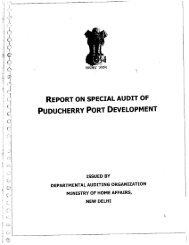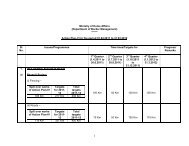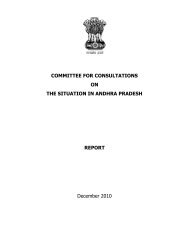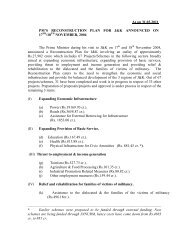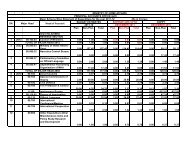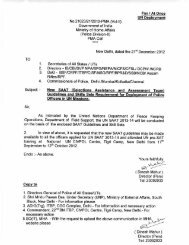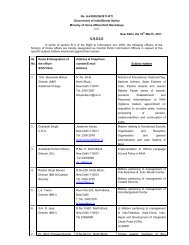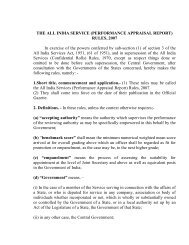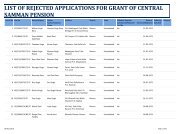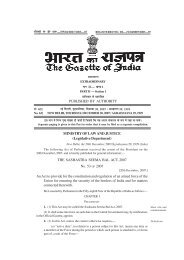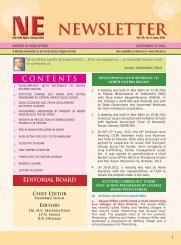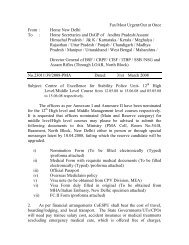Dr. Justice V.S. Malimath Report First pages - Ministry of Home Affairs
Dr. Justice V.S. Malimath Report First pages - Ministry of Home Affairs
Dr. Justice V.S. Malimath Report First pages - Ministry of Home Affairs
Create successful ePaper yourself
Turn your PDF publications into a flip-book with our unique Google optimized e-Paper software.
245<br />
20.22 SELF-REGULATION, REPORTING SYSTEM AND LAW<br />
20.22.1 There has always been a tendency to allow self-regulation, to a<br />
large extent to pr<strong>of</strong>essional as well as companies. This has also happened in the<br />
cyber area, especially the Internet. The failure <strong>of</strong> the accounting, auditing and<br />
other pr<strong>of</strong>essionals have thrown up the weaknesses in the system. It is necessary<br />
to intervene where such self-regulation has failed. At the same time<br />
Government, to reduce the burden on itself, should work closely and<br />
continuously with business by cleaning up regulations, enacting new laws and<br />
help in prosecutions. This is particularly true <strong>of</strong> cyber crime. This is important<br />
as fraudsters are clever and are ahead <strong>of</strong> Government and most companies in the<br />
sophistication <strong>of</strong> their technical knowledge. There is <strong>of</strong> course the balance<br />
between privacy protection, legitimate business use <strong>of</strong> private data and<br />
prevention <strong>of</strong> cyber fraud. Here, we have to sacrifice some <strong>of</strong> our individual<br />
interest in the interest <strong>of</strong> fraud prevention in Society. If this initiative is not<br />
taken by the Parliament, there will be plethora on conflicting decisions by<br />
different courts at different levels – now a new phenomenon- that will inhibit<br />
the development <strong>of</strong> cyber commerce not to mention reduce the effectiveness law<br />
enforcement investigations and international co-operation to reduce such<br />
crimes.<br />
20.23 CONFUSION IN REGULATION<br />
20.23.1 The various frauds and scandals in the past but over the past two<br />
decades in particular, have made it abundantly clear that we need for a clear<br />
demarcation <strong>of</strong> responsibilities for and accountability <strong>of</strong> both the regulators and<br />
regulated. For example, Banks come under regulation by both RBI and the<br />
Banking department <strong>of</strong> Govt., <strong>of</strong> India and in a smaller way SEBI as well as<br />
other company law regulators. When the RBI intervened to control the NBFC’s<br />
it was both heavy handed and indiscriminate. RBI regulates banks and has its<br />
representatives sitting as Directors on the board <strong>of</strong> banks, which is somewhat<br />
anomalous. The regulation <strong>of</strong> National Bank for Agriculture and Rural Bank (<br />
NABARD ), National Housing Bank (NHB) and such are not clear. Security<br />
Exchange Board o India (SEBI) regulates the mutual funds but not the UTI<br />
which has got into serious difficulties, in a sense victimising its customers. The<br />
co-operative banks and chit funds are not under any kind <strong>of</strong> acceptable<br />
supervision. In brief, the regulatory system, if it can be called that, has ensured<br />
neither compliance nor accountability. In the last decade or so the unanswered<br />
question which has emerged in how to make the regulators themselves<br />
accountable. Hence the need for looking at the regulatory systems to ensure<br />
that there is no confusion in regulation, participation by the regulators in the<br />
regulated institutions; applicability <strong>of</strong> similar rules to those similarly placed and<br />
no over-lapping or the issue <strong>of</strong> conflicting orders etc. This is necessary not only<br />
to promote good governance but also to avoid conflict <strong>of</strong> interest.



